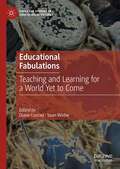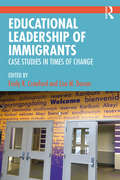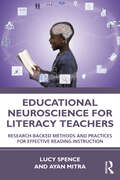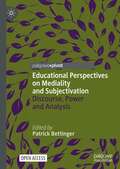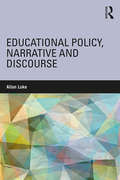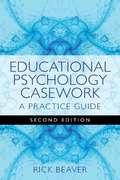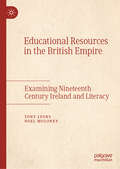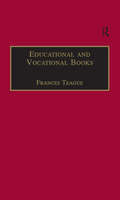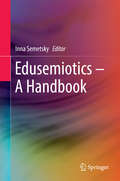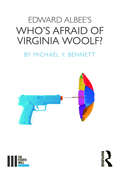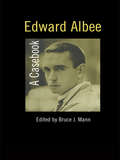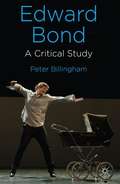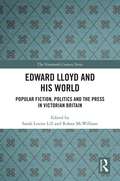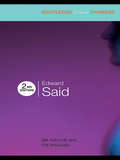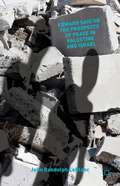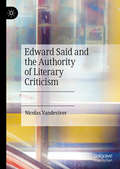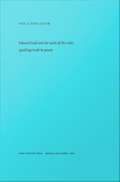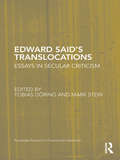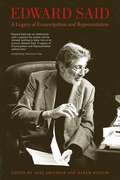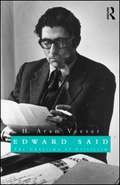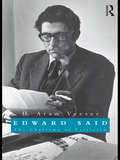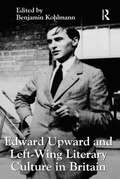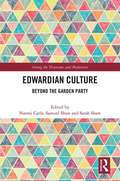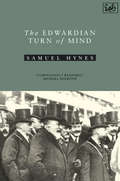- Table View
- List View
Educational Fabulations: Teaching and Learning for a World Yet to Come (Palgrave Studies in Educational Futures)
by Sean Wiebe Diane ConradThis highly original collection presents speculative fiction as fiction-based research to re-imagine education in the future. Given the particular convergence of economic and governmental pressures in educational institutions today, schools represent imaginative sites especially well-suited to interrogation through an SF lens. The relevance for education of the exploration and interrogation of themes related to technology, human nature, and social organization is evident; yet the speculative fiction approach is unique in its harnessing of creative capacities to envision alternatives. The contributions in this collection are generated from educational experience and research, drawing on scholarship in curriculum studies and teacher education and on the authors' experiences and imaginations as teachers, teacher educators, educational scholars, and human beings.
Educational Leadership of Immigrants: Case Studies in Times of Change
by Emily R. Crawford Lisa M. DornerThis book prepares current and future educational leaders to adapt to the changing terrain of U.S. demographics, education, and immigration policy. Educational Leadership of Immigrants highlights the educational practices and discourses around immigration that intersect with policies and laws, in order to support K-12 students’ educational access and families’ participation in schooling. Drawing primarily on research from the fields of educational leadership and educational policy, this book employs a case study approach to address immigration in public schools and communities; school leaders’ responses to ethical dilemmas; the impact of immigration policy on undocumented students; and the varying cultural, sociopolitical, legal and economic contexts affecting students’ educational circumstances. Special features include: • case narratives drawn from real-life experiences to support the educational needs of immigrant students; • teaching activities and reflective discussion questions pertaining to each case study to crystallize leaders’ knowledge and facilitate their comfort levels in practice; • discussions of current challenges in education facing immigrant students, their families, educators, and school leaders, especially with changing immigration law.
Educational Neuroscience for Literacy Teachers: Research-backed Methods and Practices for Effective Reading Instruction
by Lucy Spence Ayan MitraBridging the world of reading instruction and applied cognitive neuroscience, this book presents research-backed reading instructional methods and explains how they can be understood through the lens of brain processes. Dispelling myths about neuroscience, Spence and Mitra explore how brain-based research informs literacy research in a way that is clear and accessible to pre-service teachers. Chapters address theories of reading, social-emotional learning, phonological processes, embodiment, multilingualism, reading comprehension, and more. Featuring examples of instruction and consistent "Did you know?" and "Food for thought" sections, readers will come away with a greater understanding of the reading brain and how neuroscience can facilitate effective instruction. Delving into the extent to which neuroscience can underpin reading research, this text is ideal for pre-service teachers, educators, and students in the fields of language arts and literacy, as well as cognitive neuroscience.
Educational Perspectives on Mediality and Subjectivation: Discourse, Power and Analysis (Palgrave Studies in Educational Media)
by Patrick BettingerThis open access book examines the complex relationship between education, media and power. Exploring the entanglement of education media and power structures, the contributions use various examples and case studies to demonstrate how subjectivation processes and digital structures interact with one another. The book asks which modes of subjectivation can be identified with current media cultures, how subjects deal with the challenges and potential of digitality, and how coping and empowerment strategies are developed. By addressing theoretical as well as empirical evidence, the chapters illuminate these connections and the subsequent significance for media education more widely.
Educational Policy, Narrative and Discourse
by Allan LukeThis collection of Allan Luke’s key writings on educational policy, curriculum, and school reform follows the development and use of critical discourse analyses to study educational policy and practice. Turning to a series of narrative analyses of the relationship between politics, culture, economics, and education, Luke‘s writings address the challenges of shifting from an academic and scientific critique of policy to ‘getting your hands dirty’ in the making of state educational policy. The volume includes international examples of policy formation for social justice and equity, and closes with an auto-ethnographic view on policymaking and the need for increased critical, sociological evidence-based educational reform. Together with its companion volume, Critical Literacy, Schooling and Social Justice: The Selected Works of Allan Luke, this collection gathers Luke’s seminal key writings spanning the fields of education, applied linguistics, sociology, and cultural studies for the benefit of scholars, students, teachers, and teacher educators around the world.
Educational Psychology Casework
by Rick BeaverEducational Psychology Casework is a practical, accessible guide to working with children, outlining the basic skills needed and practical strategies to promote positive change and obtain the best results for children. The book covers how to develop skills such as establishing rapport, gaining a child's trust and respect, interviewing skills and techniques, and interpreting children's responses. The author outlines the theoretical background and how this translates into practical work and includes case examples which demonstrate the theory in practice. This fully updated second edition includes new chapters on problem-solving versus solution-focused work and also on measures of impact. This book is essential reading for all trainee and practising educational psychologists.
Educational Resources in the British Empire: Examining Nineteenth Century Ireland and Literacy
by Tony Lyons Noel MoloneyThis book explores the impact of the Lesson Books of the National Board of Education in Ireland in the nineteenth century. The author contextualizes the books used in national schools as well as across the wider British Empire: in doing so, he highlights the influence of the religious, social, political and cultural realms of the time. Firmly grounding the volume in its historical context, the author goes on to explore the contemporary moral climate and social influences, including imperialism, morality, rote-learning and socialization. Through meticulous analysis of each Lesson Book, the author traces the evolution of education in Ireland as a reflection of contemporary society, as it changes and transforms in line with cultural, religious and social changes. This pioneering and comprehensive volume will be of interest and value to students and scholars of education in Ireland as well as education in the British Empire more widely.
Educational and Vocational Books: Printed Writings 1641–1700: Series II, Part One, Volume 5 (The Early Modern Englishwoman: A Facsimile Library of Essential Works & Printed Writings, 1641-1700: Series II, Part One #Vol. 8)
by Frances TeagueFrom the beginning of the seventeenth century, English society started to become preoccupied with education and how people acquired it. It is all the more surprising, then, that there should be relatively few early modern texts by Englishwomen devoted to the question of how one should learn. The four texts printed here are principally concerned with language and arithemetic. One of the reasons for the paucity of such writings is that many commentators viewed women's ability to write as a threat to social stability. The education of women was at best ad hoc. A few attended dame schools, and the wealthy could afford private tutors. Among her own family and friends, however, the individual learned girl was often celebrated, and instances of formal praise act as forewords to some of the texts printed in this volume.
Edupress Figurative Language Reading Comprehension Book Reading Level 3.5-5.0
by EdupressThis resource is an effective tool for instruction, practice, and evaluation of student understanding. It includes ideas on how to introduce figurative language to students, as well as activities to help teach and practice the concept.
Edusemiotics – A Handbook
by Inna SemetskyEdusemiotics is a pioneering area of study that connects semiotics - the science of signs - with educational theory and the philosophy of education. This volume reflects cutting-edge research by scholars in education and in semiotics worldwide, bridging the two discourses to present the state of the art in this new transdisciplinary field. The book's emphasis is on educational theory as based on semiotic philosophy: as such, it challenges the current conception of semiotics in education as merely a sub-branch of applied semiotics. It presents edusemiotics as a novel unified conceptual framework at the interface of theoretical semiotics and educational philosophy, based on both theoretical and empirical studies from around the world. The chapters in this handbook also bring to the fore the intellectual legacy of Charles S. Peirce, John Dewey, Gilles Deleuze, Umberto Eco, Julia Kristeva, Mikhail Bakhtin, Paul Ricoeur, Martin Heidegger and other thinkers, pointing out the implications of edusemiotics for meaningful pedagogy and experiential learning in diverse contexts.
Edward Albee's Who's Afraid of Virginia Woolf? (The Fourth Wall)
by Michael Y. BennettEdward Albee’s Who’s Afraid of Virginia Woolf? shocked audiences and critics alike with its assault on decorum. At base though, the play is simply a love story: an examination of a long-wedded life, filled with the hopes, dreams, disappointments, and pain that accompany the passing of many years together. While the ethos of the play is tragicomic, it is the anachronistic, melodramatic secret object—the nonexistent "son"—that upends the audience’s sense of theatrical normalcy. The mean and vulgar bile spewed among the characters hides these elements, making it feel like something entirely "new." As Michael Y. Bennett reveals, the play is the same emperor, just wearing new clothes. In short, it is straight out of the grand tradition of living room drama: Ibsen, Chekhov, Glaspell, Hellmann, O’Neill, Wilder, Miller, Williams, and Albee.
Edward Albee: A Casebook (Casebooks on Modern Dramatists #Vol. 29)
by Bruce MannFrom the "angry young man" who wrote Who's Afraid of Virginia Woolf in 1962, determined to expose the emptiness of American experience to Tiny Alice which reveals his indebtedness to Samuel Beckett and Eugene Ionesco's Theatre of the Absurd, Edward Albee's varied work makes it difficult to label him precisely. Bruce Mann and his contributors approach Albee as an innovator in theatrical form, filling a critical gap in theatrical scholarship.
Edward Bond: A Critical Study
by Peter BillinghamThis new study of one of Britain's greatest modern playwrights represents the first major, extended discussion of Edward Bond's work in over twenty years. The book combines rigorous and stimulating analysis and discussion of Bond's plays and ideas about drama and society. For the first time, there is also discussion of selected plays from his later, post-2000 period, including Innocence and Have I None, alongside explorations of widely studied plays such as Saved.
Edward Lloyd and His World: Popular Fiction, Politics and the Press in Victorian Britain (The Nineteenth Century Series)
by Rohan McWilliam Sarah Louise LillThe publisher Edward Lloyd (1815-1890) helped shape Victorian popular culture in ways that have left a legacy that lasts right up to today. He was a major pioneer of both popular fiction and journalism but has never received extended scholarly investigation until now. Lloyd shaped the modern popular press: Lloyd's Weekly Newspaper became the first paper to sell over a million copies. Along with publishing songs and broadsides, Lloyd dominated the fiction market in the early Victorian period issuing Gothic stories such as Varney the Vampire (1845-7) and other 'penny dreadfuls', which became bestsellers. Lloyd's publications introduced the enduring figure of Sweeney Todd whilst his authors penned plagiarisms of Dickens's novels, such as Oliver Twiss (1838-9). Many readers in the early Victorian period may have been as likely to have encountered the author of Pickwick in a Lloyd-published plagiarism as in the pages of the original author. This book makes us rethink the early reception of Dickens. In this interdisciplinary collection, leading scholars explore the world of Edward Lloyd and his stable of writers, such as Thomas Peckett Prest and James Malcolm Rymer. The Lloyd brand shaped popular taste in the age of Dickens and the Chartists. Edward Lloyd and his World fills a major gap in the histories of popular fiction and journalism, whilst developing links with Victorian politics, theatre and music.
Edward Said (Routledge Critical Thinkers)
by Bill Ashcroft Pal AhluwaliaEdward Said is perhaps best known as the author of the landmark study Orientalism, a book which changed the face of critical theory and shaped the emerging field of post-colonial studies, and for his controversial journalism on the Palestinian political situation. Looking at the context and the impact of Said's scholarship and journalism, this book examines Said's key ideas, including: the significance of 'worldliness', 'amateurism', 'secular criticism', 'affiliation' and 'contrapuntal reading' the place of text and critic in 'the world' knowledge, power and the construction of the 'Other' links between culture and imperialism exile, identity and the plight of Palestine a new chapter looking at Said's later work and style This popular guide has been fully updated and revised in a new edition, suitable for readers approaching Said's work for the first time as well as those already familiar with the work of this important theorist. The result is the ideal guide to one of the twentieth century's most engaging critical thinkers.
Edward Said On The Prospects Of Peace In Palestine And Israel
by John Randolph LeblancJohn Randolph LeBlanc examines the political oeuvre of critic and activist Edward Said and finds that Said preferred "reconciliation" to segregation in Palestine/Israel. LeBlanc argues that Said's criticism speaks to the importance of negotiating the troubling, proximate, and unsettling presence of our most perplexing others.
Edward Said and the Authority of Literary Criticism
by Nicolas VandeviverThis book examines the earliest writings of Edward Said and the foundations of what came to be known as postcolonial criticism, in order to reveal how the groundbreaking author of Orientalism turned literary criticism into a form of political intervention. Tracing Said’s shifting conceptions of ‘literature’ and ‘agency’ in relation to the history of (American) literary studies in the thirty years or so between the end of World War II and the last quarter of the twentieth century, this book offers a rich and novel understanding of the critical practice of this indispensable figure and the institutional context from which it emerged. By combining broad-scale literary history with granular attention to the vocabulary of criticism, Nicolas Vandeviver brings to light the harmonizing of methodological conflicts that informs Said’s approach to literature; and argues that Said’s enduring political significance is grounded in his practice as a literary critic.
Edward Said and the Work of the Critic: Speaking Truth to Power
by Paul A. BovéFor at least two decades the career of Edward Said has defined what it means to be a public intellectual today. Although attacked as a terrorist and derided as a fraud for his work on behalf of his fellow Palestinians, Said's importance extends far beyond his political activism. In this volume a distinguished group of scholars assesses nearly every aspect of Said's work--his contributions to postcolonial theory, his work on racism and ethnicity, his aesthetics and his resistance to the aestheticization of politics, his concepts of figuration, his assessment of the role of the exile in a metropolitan culture, and his work on music and the visual arts. In two separate interviews, Said himself comments on a variety of topics, among them the response of the American Jewish community to his political efforts in the Middle East. Yet even as the Palestinian struggle finds a central place in his work, it is essential--as the contributors demonstrate--to see that this struggle rests on and gives power to his general "critique of colonizers" and is not simply the outgrowth of a local nationalism. Perhaps more than any other person in the United States, Said has changed how the U. S. media and American intellectuals must think about and represent Palestinians, Islam, and the Middle East. Most importantly, this change arises not as a result of political action but out of a potent humanism--a breadth of knowledge and insight that has nourished many fields of inquiry. Originally a special issue of boundary 2, the book includes new articles on minority culture and on orientalism in music, as well as an interview with Said by Jacqueline Rose. Supporting the claim that the last third of the twentieth century can be called the "Age of Said," this collection will enlighten and engage students in virtually any field of humanistic study. Contributors. Jonathan Arac, Paul A. Bov, Terry Cochran, Barbara Harlow, Kojin Karatani, Rashid I. Khalidi, Sabu Kohsu, Ralph Locke, Mustapha Marrouchi, Jim Merod, W. J. T. Mitchell, Aamir R. Mufti, Jacqueline Rose, Edward W. Said, Gayatri Chakravorty Spivak, Lindsay Waters
Edward Said's Translocations: Essays in Secular Criticism (Routledge Research in Postcolonial Literatures)
by Mark Stein Tobias DöringWorking with processes of translocation enabled Edward Said to point out interdependence and complementarity across geographical borders and disciplinary boundaries while recognizing cultural difference and the distinct historical experiences of colonizer and colonized. This book brings into focus Said’s politics of reading, from his literary criticism in English to his political columns in Arabic. The international contributors—from Britain, Egypt, France, Germany, India, Switzerland, and the United States—investigate his intellectual legacies without necessarily identifying themselves with the critical positions these involve. Instead of treating his work as a unitary theoretical system, the various arguments explored offer a critical assessment of those situations in which his writing has entered into a productive relationship with other theoretical positions and interlocutors. The collection considers location, which has always been a central category in and for Said’s writing; readings, which designates the acts by which, according to Said, the world comes to be constituted; and legacies, which pertains to the many fields across the boundaries of established academic disciplines that have taken up Said’s challenges. The critical positions visited in this book include critical and cultural theory, postcolonialism, literary studies, theatre and performance studies, and visual and music studies.
Edward Said: A Legacy of Emancipation and Representation
by Adel Iskandar and Hakem RustomEdward W. Said (1935–2003) ranks as one of the most preeminent public intellectuals of our time. Through his literary criticism, his advocacy for the Palestinian cause, and his groundbreaking book Orientalism, Said elegantly enriched public discourse by unsettling the status quo. This indispensable volume, the most comprehensive and wide-ranging resource on Edward Said’s life and work, spans his broad legacy both within and beyond the academy. The book brings together contributions from thirty-one luminaries—leading scholars, critics, writers, and activists—to engage Said’s provocative ideas. Their essays and interviews explore the key themes of emancipation and representation through the prisms of postcolonial theory, literature, music, philosophy, and cultural studies.Contributors: Bill Ashcroft, Ben Conisbee Baer, Daniel Barenboim, Timothy Brennan, Noam Chomsky, Denise DeCaires-Narain, Nicholas Dirks, Marc H. Ellis, Rokus de Groot, Sabry Hafez, Abdirahman A. Hussein, Ardi Imseis, Adel Iskandar, Ghada Karmi, Katherine Callen King, Joseph Massad, W. J. T. Mitchell, Laura Nader, Ilan Pappe, Benita Parry, Rajagopalan Radhakrishnan, Jahan Ramazani, Jacqueline Rose, Lecia Rosenthal, Hakem Rustom, Avi Shlaim, Ella Habiba Shohat, Robert Spencer, Gayatri Chakravorty Spivak, Anastasia Valassopoulos, Asha Varadharajan, Michael Wood
Edward Said: The Charisma of Criticism
by H. Aram VeeserThe author brings about the actual man in Edward Said -- embedded in the politics of the Middle East but soaked in the values of the West and struggling to advance the best European ideas.
Edward Said: The Charisma of Criticism
by H. Aram VeeserThis insightful critical biography shows us an Edward Said we did not know. H. Aram Veeser brings forth not the Said of tabloid culture, or Said the remote philosopher, but the actual man, embedded in the politics of the Middle East but soaked in the values of the West and struggling to advance the best European ideas. Veeser shows the organic ties connecting his life, politics, and criticism. Drawing on what he learned over 35 years as Said's student and skeptical admirer, Veeser uses never-before-published interviews, debate transcripts, and photographs to discover a Said who had few inhibitions and loathed conventional routine. He stood for originality, loved unique ideas, wore marvelous clothes, and fought with molten fury. For twenty years he embraced and rejected, at the same time, not only the West, but also literary theory and the PLO. At last, his disgust with business-as-usual politics and criticism marooned him on the sidelines of both. The candid tale of Said's rise from elite academic precincts to the world stage transforms not only our understanding of Said—the man and the myth—but also our perception of how intellectuals can make their way in the world.
Edward Upward and Left-Wing Literary Culture in Britain
by Benjamin KohlmannOffering the first book-length consideration of Edward Upward (1903-2009), one of the major British left-wing writers, this collection positions his life and works in the changing artistic, social and political contexts of the twentieth and early twenty-first centuries. Upward’s fiction and non-fiction, from the 1920s onwards, illustrate the thematic and formal richness of left-wing writing during the twentieth-century age of extremes. At the same time, Upward’s work shows the inherent tensions of a life committed at once to writing and to politics. The full range of Upward’s work and a wealth of unpublished materials are examined, including his early fantastic stories of the 1920s, his Marxist fiction of the 1930s, the extraordinary semi-autobiographical trilogy The Spiral Ascent and his formally and thematically innovative later stories. The essays collected here reevaluate Upward’s central place in twentieth-century British literary culture and assess his legacy for the twenty-first century.
Edwardian Culture: Beyond the Garden Party (Among the Victorians and Modernists)
by Sarah Shaw Samuel Shaw Naomi CarleEdwardian Culture: Beyond the Garden Party is the first truly interdisciplinary collection of essays dealing with culture in Britain c.1895-1914. Bringing together essays on literature, art, politics, religion, architecture, marketing, and imperial history, the study highlights the extent to which the culture and politics of Edwardian period were closely intertwined. The book builds upon recent scholarship that seeks to reclaim the term ‘Edwardian’ from prevalent, restrictive usages by venturing beyond the garden party – and the political rally – to uncover some of the terrain that lies between. The essays in the volume – which deal with both famous writers such as J. M. Barrie and Arnold Bennett, as well as many lesser-known figures – draw attention to the nuanced multiplicity of experience and cultural forms that existed during the period, and highlight the ways in which a closer examination of Edwardian culture complicates our definitions of ‘Victorian’ and ‘Modern’. The book argues that the Edwardian era, rather than constituting a coda to the Victorian period or a languid pause before modernism shook things up, possessed a compelling and creative tenor of its own.
Edwardian Turn Of Mind
by Samuel HynesThe Edwardian Turn of Mind brilliantly evokes the cultural temper of an age. The years between the death of Queen Victoria and the outbreak of the First World War witnessed a turbulent and dramatic struggle between the old and the new. Samuel Hynes considers the principal areas of conflict - politics, science, the arts and the relations between men and women - and fills them with a wide-ranging cast of characters: Tories, Liberals and Socialists, artists and reformers, psychoanalysts and psychic researchers, sexologists, suffragettes and censors. His book is a portrait of a tumultuous time - out of which contemporary England was made.
